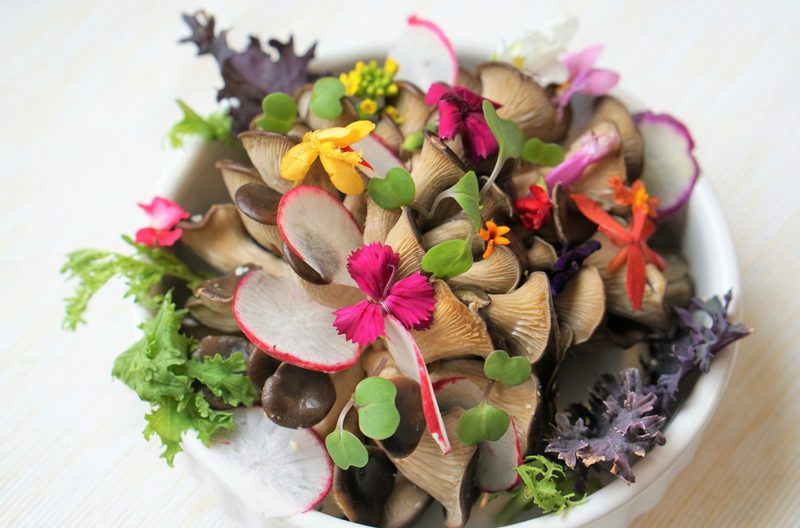The Paleo Diet has recently become popular amongst Hollywood A-listers and the everyday woman, just like us. But what are the top paleo diet benefits? Can a cavewoman diet make you look like a movie star?
The Paleolithic Diet, more commonly called “paleo,” has been steadily gaining popularity and claims to return our bodies to their ideal state. This is done by eating only the foods that our ancestors were genetically designed to eat. Our ancestors were nomadic and survived by hunting and gathering whatever they found along the way.
Advances in agricultural farming eventually changed what our ancestors ate. Dairy, grains, and legumes became staples in the human diet. Therefore, the human body had little evolutionary time to adapt to a grain and legume-based, sedentary lifestyle. As a result, the body’s ability to adapt was outpaced. This is believed to be a major cause of obesity, diabetes and heart disease today. Once you understand these paleo diet basics, you’ll be on your way to a healthier you!
Fun Fact: Even though the Paleo diet comes from the Paleolithic era, which dates from approximately 2.5 million to 10,000 years ago, only in the last 40 years has it gained attention.[1]
Paleo Diet Basics: What is the Paleo Diet?
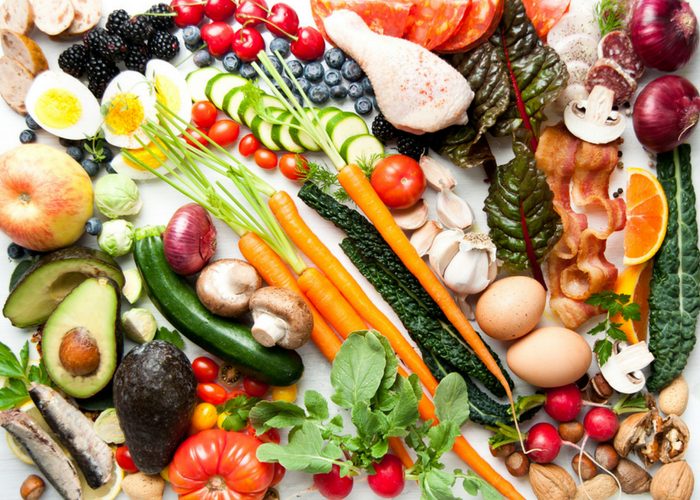
In general, the paleo diet is all about unprocessed, natural foods. The basic reason that humans have become attracted to this diet is the claim that our hunting-gathering ancestors never suffered from modern diseases.
Today, a modern version of the paleo diet consists of lean meats, fish, vegetables and nuts, completely cutting out anything our paleolithic ancestors didn’t eat. As a result, our bodies enjoy reduced inflammation, a decreased risk for Type II Diabetes, and improved cardiovascular health. That means no more processed foods. Also, say goodbye to anything with sugar or dairy.
It is important to realize that there is no one right way to reap the paleo diet benefits. Some paleo dieters do include things like dairy and rice in their meals. You may even be surprised to know you don’t have to say goodbye to your favorite sweet treats. It’s easy enough to whip up paleo brownies, paleo cookies, or even paleo-friendly muffins to satisfy your sweet tooth. It’s all about balance and what makes you feel your very best. Rest assured there is a paleo diet that will work for everyone.
Before you say goodbye to your wine and cheese, let’s examine what the paleo diet is. We’ll also take a look at paleo diet results, what it does and doesn’t do, and if it makes sense to start eating like a cavewoman.
Digging Deeper into Paleo Diet Results
There are a lot of myths and misconceptions when it comes to paleo diet basics and paleo diet results. Let’s take a look:
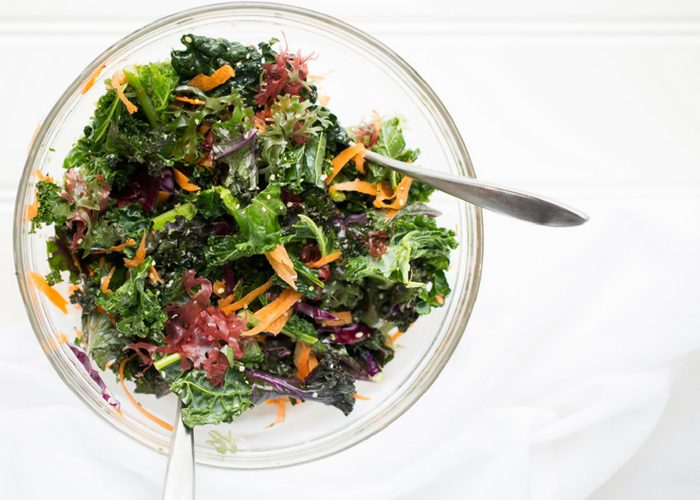
Myth #1: You can eat whatever you want, as long as it is considered paleo
Truth: This is the myth that gives us the answer to our biggest question: does the paleo diet work? Let’s just say it isn’t a free pass to binge. A study of 39 women who began a paleo diet has proven that you may actually begin to consume more calories than you should.[2]
The main paleo diet benefits are that you are eating real, whole foods. You can mostly eat them in unlimited portions. However, it is super important that you eat all foods in moderation. The satisfaction and fullness scale is high on this one because you are fueling your body with protein and higher density carbs that help you power through the day. Chances are you won’t want to binge on other foods after eating a plate of veggies.
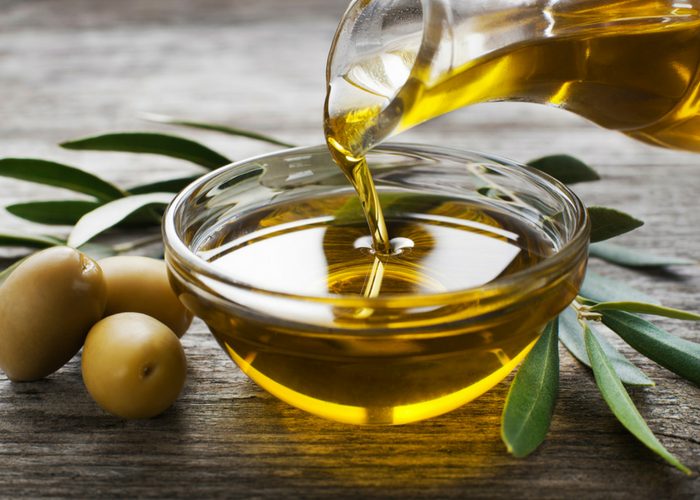
Myth #2: Eating paleo means NO processed foods
Truth: While technically true, paleo diet basics actually do include processed foods.[3] Things like olive oil are processed but are still a main staple in the diet. You might also be seeing a lot of paleo protein powders on store shelves. It’s fair to assume our ancestors were not throwing back protein shakes before a big hunt.

Myth #3: You can drink anything you want
Truth: As with any diet, water is always the go-to for optimum health and wellness. This applies to the paleo diet since other beverages weren’t available during the stone age. It’s interesting to note, for instance, most people think they are hungry when they are really just dehydrated, so be sure to drink plenty of water throughout the day.
Tea and coffee are not strictly paleo, but are acceptable. Alcohol is a big no-no. This includes ALL alcohol except for a few, select, organically fermented paleo-friendly wines in small amounts. Remember, if our prehistoric parents didn’t eat it, you can’t either.
If you want to earn all the paleo diet benefits possible, steer clear of beer, wine, soda, and sugary drinks.

Myth #4: You can dine out without a problem
Truth: You might really have some trouble following these paleo diet basics if you decide to eat at a restaurant. Most prepared dishes are going to contain non-paleo foods like canola oil or soy. In fact, studies have shown that there is “substantial inaccuracy” in the counting of calories in individual plates of food when dining out.[4]
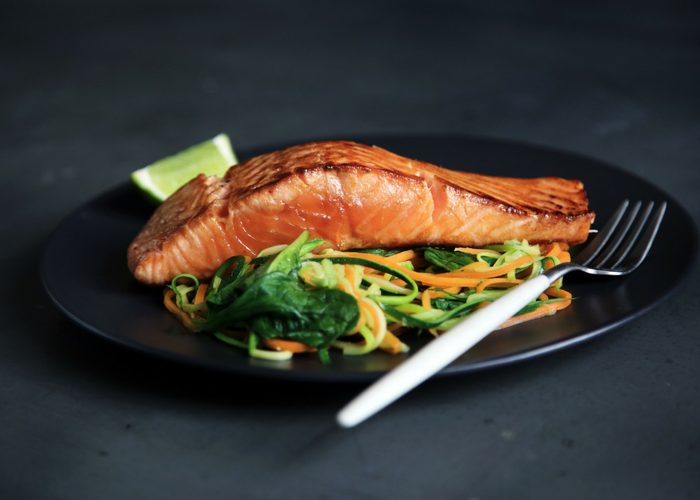
Myth #5: You’ll save money
Truth: You may think you will do less shopping as you begin to enjoy your paleo diet benefits. The truth is that you might actually spend more money. Typically, processed and prepared foods cost less than fresh produce and meat. The same study of 39 women who began the paleo diet proved that there was an increase in their grocery bill.[5] Your wallet may take a hit if you’re visiting the butcher a few times a week.
Does the Paleo Diet Work?
The paleo diet has been shown to help your waistline, aid in weight loss, lower cholesterol levels, and even improve your blood pressure. However, it has also been shown to increase your risk of osteoporosis because of the lack of calcium and vitamin D in the diet. So, does the paleo diet work?
The Royal Australian College of General Practitioners (RACGP) argues that the paleo diet is over-hyped and under-studied. Their thorough studies show that this diet requires more research. In fact, the RACGP compiled the scientific studies to see how paleo diet results stood up to a diabetic or Mediterranean diet. There were only nine controlled studies done to compare the diets. The results showed no significant changes in cholesterol, insulin levels, or blood pressure. In fact, the studies even suggest that the paleo diet is 10% more expensive than a diet of similar nutritional value.[6]
On the other hand, some studies have actually shown improvement in glucose tolerance. For twelve weeks scientists compared the paleo diet with the Mediterranean diet and proved that the paleo diet group improved glycemic control and decreased their waist circumference.[7] Plus, eliminating sugary processed foods is always a healthier way to eat. There have been positive paleo diet studies that suggest those who cut out carbs and sugar show improvement in metabolic syndromes and blood pressure.[8]
Let’s take a look at some more pros and cons of this prehistoric diet.
The Top Paleo Diet Benefits for Diabetics
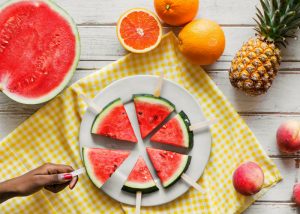
Does the paleo diet work for women with medical conditions? A study of people with type 2 diabetes who followed a paleo diet for just two weeks showed they were able to improve their blood pressure, blood sugar levels, and cholesterol by significant amounts. However, this was only a moderate improvement over the control group. More research is underway to determine the paleo diet benefits for those with diabetes. It is proven, however, that these paleo diet basics are a healthy alternative to the traditional Western diet.[9]
The Top Paleo Diet Benefits for Obesity
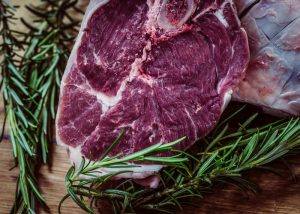
In terms of cardiovascular health, 39 healthy women (median age 47) were studied over a four-week period in a randomized trial to determine if the paleo diet held up against the Australian Guide to Healthy Eating (the national standard of dietary guidelines). Some of the women followed a strict paleo diet while others followed the national standard way of eating.
After four weeks, it was determined that while there was no difference in cardiovascular improvement from either group, the paleo diet group experienced an average weight loss of 4.5 pounds and improved body composition, although studies still need to be done to determine any long-term benefits.[10]
The Top Paleo Diet Benefits for Digestive Health
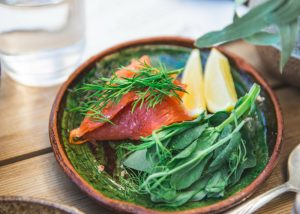
A study in 2012 was conducted to gather information on digestive paleo diet benefits. The results show that by eating a grain-free diet, you can reduce inflammation. Not only that, but eating a paleo diet also results in a healthier digestive system. The lack of grains in the paleo diet helps create a healthy bacterial environment.[11]
The Top Paleo Diet Benefits for Depression
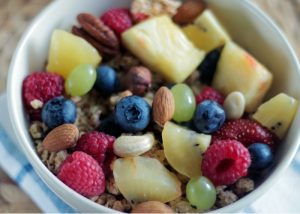
The paleo diet has loads of benefits, but one of the most important could be its ability to improve your mood. This is especially helpful for PMS and related mood swings. Eliminating grains from your diet could help you put on a happy face! Research has proven that hypersensitive people, and those with mental illness, have had marked improvements in mental symptoms when grain was removed from their diets.[12]
Many people claim to feel better overall on a paleo diet. It certainly receives high praise for its nutrient-dense focus on seafood, eggs, and dark green leafy vegetables.
Here are some of the other major paleo diet benefits:
- There are no time-frames or windows for eating.
- You’ll find no need to count macros, carbs, or fats.
- You don’t have to attend any special meetings.
- There is no need to keep a food journal.
- You’ll never need to buy special bars, shakes, or pre-packaged meals.
- Extra servings? No problem since there are no portion limits to Paleo.
Downsides of the Paleo Diet
Lots of people thrive on the paleo way of eating. In fact, many say it just feels natural, like the way humans are supposed to eat. Even though these paleo diet benefits might have you keen to hop on the paleo bandwagon, be aware of some of the other drawbacks to a hunter-gatherer lifestyle.
Vitamin deficiencies

First, there’s the issue of dairy, especially for women. If you are thinking of trying out a paleo diet, you must understand what you could potentially miss out on. Americans, in general, are consistently Vitamin D-deficient, which affects everything from depression to brain function. Women are more likely to be susceptible to Vitamin D deficiencies due to their physiological makeup.
Vitamin D and calcium are important weapons in the fight against osteoporosis. Additionally, decreased vitamin D levels can cause low estrogen in women. That means low sex drive as well as an increase in hot flashes and other menopause-related symptoms. Be sure you are taking a high-quality vitamin D supplement daily if you begin eating a paleo diet.[13]
Paleo has a price

And it can be a big one. It’s safe to say that what our ancestors hunted and gathered was organic fare. Devout paleo dieters will choose only the best in organic produce, proteins, and eggs to maximize nutritional absorption.
Your waistline may or may not shrink but your bank balance definitely will. Fresh produce doesn’t last long, so prepare to spend lots of time at the local grocery or farmer’s market.
Paleo takes prep

You may not have to count anything, but you DO have to prepare nearly everything from scratch. Strict adherence to a paleo diet means you’ll spend a good portion of your free time preparing your meals or prepping for future meals. If you love to cook, this is a great way to eat. Invest in some good food storage containers and solid cutlery for slicing and dicing all those vegetables and cuts of meat.
No more peanut butter and dairy
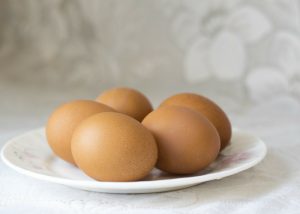
If you’re on the paleo diet, you must abstain from grains, potatoes, corn, legumes (including peanut butter), and beans (including hummus).
In addition, you can say goodbye to dairy products and processed meats (think salami, pepperoni, hot dogs). It’s safe to say that our ancestors were not hunting or gathering Doritos and Diet Coke, so any and all processed and manufactured foods are expressly forbidden as well. As a reminder, some paleo enthusiasts still include dairy in their diet. Do what works best for your body.
Be aware that any diet that excludes entire food groups requires extra caution. Always make sure those missing vitamins and minerals are replaced.
How to Get Started on the Paleo Diet
If you’re ready to give it a shot, a basic paleo food list will look something like this:
- Lean meats like chicken, turkey, pork, and lean beef, fish, seafood
- Fresh fruits and dried (unsweetened) fruits
- Non-starchy vegetables like lettuce, asparagus, green beans, broccoli, cabbage, Brussels sprouts, cauliflower, and spinach
- Nuts, like almonds, walnuts, cashews, pecans, and pistachios
- Seeds, like pumpkin and sunflower
- Eggs (whole eggs as well as yolks and egg whites)
- Plant-based oils, like olive, walnut, grapeseed, and coconut oil
As an example, here’s what a paleo diet meal would look like:
- Breakfast: Eggs and vegetables fried in coconut oil.
- Lunch: Chicken salad with olive oil. A handful of nuts.
- Dinner: Steak with vegetables and steamed veggies.
These paleo diet snacks will satisfy your need to graze and are easy to prep. They are also portable:
- Baby carrots
- Hard-boiled eggs
- A piece of fruit
- A handful of nuts
- Apple slices with almond butter
- Berries with coconut ice cream
- Homemade beef jerky
Remember, the beauty of this diet is that calorie counting is not necessary. But if you are really hungry, it’s advisable to eat more of the vegetables and less of the meat and fruit.
Fun Fact: A piece of high-quality dark chocolate (70% or higher cocoa content) can be a healthy and nutritious treat![14]
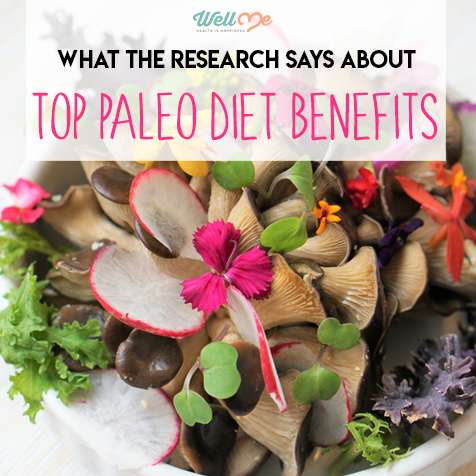
Conclusion
There’s solid medical proof that an anti-inflammatory diet like the paleo diet is good for overall health and even some weight loss. And at the end of the day, you want to feel and look good. Once you understand these paleo diet basics, making informed choices can make all the difference between a diet and a lifestyle. A paleo diet can be a positive step in the right direction towards improved physical and mental health.
References
- [1] https://www.ncbi.nlm.nih.gov/books/NBK482457/
- [2] https://www.ncbi.nlm.nih.gov/pmc/articles/PMC4997394/
- [3] https://www.ncbi.nlm.nih.gov/books/NBK482457/
- [4] https://www.ncbi.nlm.nih.gov/pmc/articles/PMC4363942/
- [5] https://www.ncbi.nlm.nih.gov/pmc/articles/PMC4997394/
- [6] https://www.racgp.org.au/afp/2016/januaryfebruary/cutting-through-the-paleo-hype-the-evidence-for-the-palaeolithic-diet/
- [7] https://www.ncbi.nlm.nih.gov/pubmed/17583796
- [8] https://www.ncbi.nlm.nih.gov/pubmed/26269362
- [9] https://www.ncbi.nlm.nih.gov/pmc/articles/PMC2787021/
- [10] https://www.ncbi.nlm.nih.gov/pmc/articles/PMC4997394/
- [11] https://www.ncbi.nlm.nih.gov/pmc/articles/PMC3402009/
- [12] https://www.ncbi.nlm.nih.gov/pmc/articles/PMC4809873/
- [13] https://www.ncbi.nlm.nih.gov/pmc/articles/PMC4545131/
- [14] https://www.healthline.com/nutrition/paleo-diet-meal-plan-and-menu#section8

